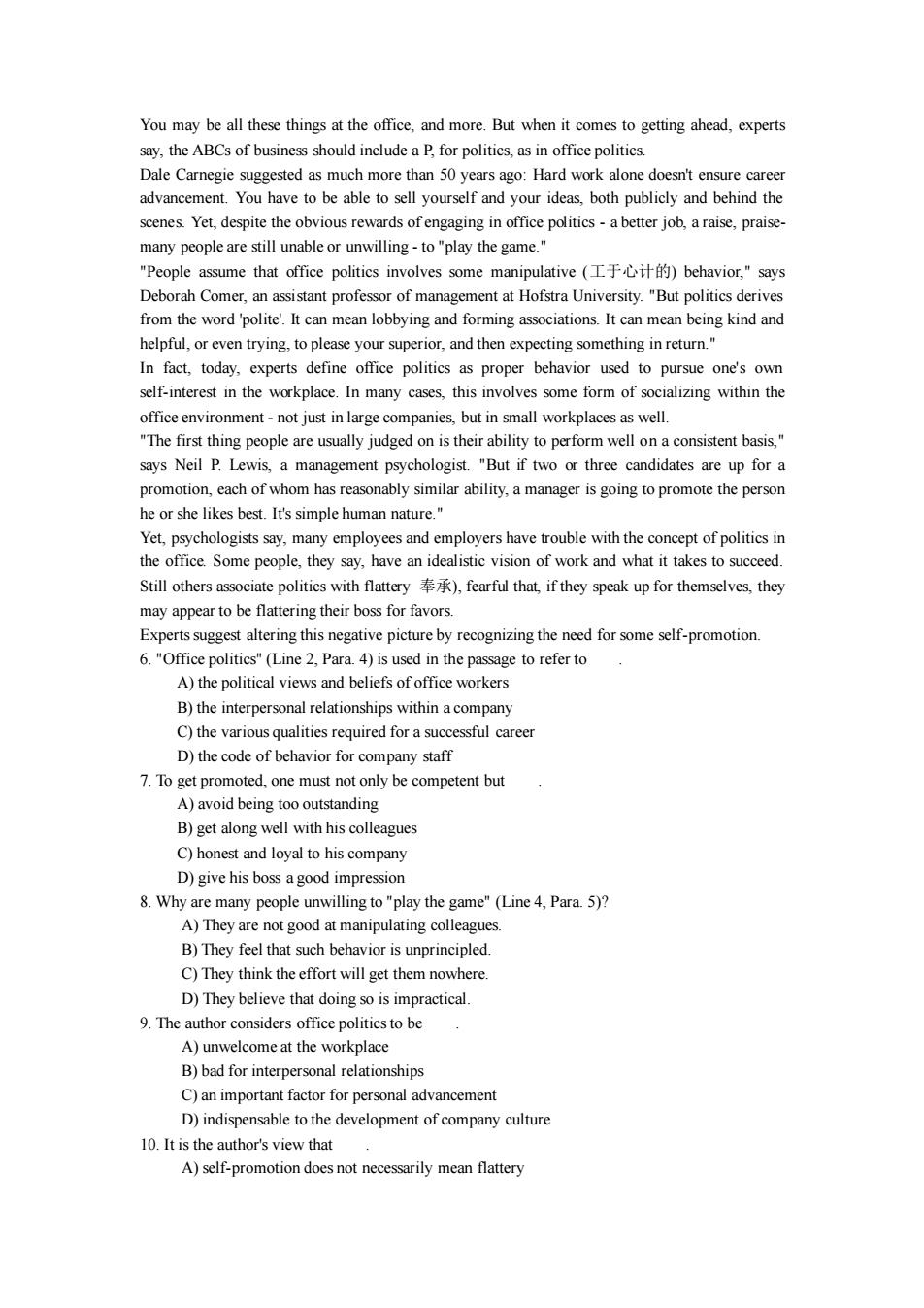正在加载图片...

You may be all these things at the office,and more.But when it comes to getting ahead,experts %灰ABCSobnsohnaEmis8oe advancement.You have to be able to sell yourself and your ideas,both publicly and behind the scenes.Yet,despite the obvious rewards of engaging in office politics-a better job,a raise,praise. many people are still unable or unwilling-to"play the game." assume that office politics involves some manipulative(工于心i计的)beha vior," Deborah Comer,an om the wrd polite tcan mean obvin and formni r of manag rsity.But politics er helpful,or even trying,to please your superior,and then expecting something in return. In fact today experts define office politics as proper behavior used to pursue one's own self-interest in the workplace.In many cases.this involves some form of socializing within the ironment-not just in large ompanies out in s mall workplaces thern People areugd ontheir tooents says Neil P.Lewis.a management psychologist."But if two or three candidates are up for a promotion.each of whom has reasonably similar ability,a manager is going to promote the person he or she likes best.It's simple human nature." Yet,psychologists say,many emplo s and er the oyers have t rouble with the ofpolitics in office Some people,they say. ave ar 10 ork and whati it takes to suc Still others associate politics with flattery),fearful that,if they speak up for themselves,they may appear to be flattering their boss for favors Experts suggest altering this negative picture by recognizing the need for some self-promotion. 6.fice politics"(Line Para.)is used in the pa sage to refer to A)the political nd beliefs of offi ace workers B)the interpersonal relationships within acompany C)the various qualities required for a successful career D)the code of behavior for company staff 7.To get promoted.one must not only be competent but A)avoid being too oustanding C)honest and loyal to his company D)give his boss a good impression 8.Why are many people unwilling to"play the game"(Line 4.Para 5)? A)They are not good at man B)They feel that such behavior is unprinciplcd C)They think the effort will get them nowher D)They believe that doing so is impractical 9.The author considers office politics to be A)unwelcome at the workplace B)bad C)for personal advancemen D)indispensable to the development of company culture 10.It is the author's view that A)self-promotion does not necessarily mean flattery You may be all these things at the office, and more. But when it comes to getting ahead, experts say, the ABCs of business should include a P, for politics, as in office politics. Dale Carnegie suggested as much more than 50 years ago: Hard work alone doesn't ensure career advancement. You have to be able to sell yourself and your ideas, both publicly and behind the scenes. Yet, despite the obvious rewards of engaging in office politics - a better job, a raise, praisemany people are still unable or unwilling - to "play the game." "People assume that office politics involves some manipulative (工于心计的) behavior," says Deborah Comer, an assistant professor of management at Hofstra University. "But politics derives from the word 'polite'. It can mean lobbying and forming associations. It can mean being kind and helpful, or even trying, to please your superior, and then expecting something in return." In fact, today, experts define office politics as proper behavior used to pursue one's own self-interest in the workplace. In many cases, this involves some form of socializing within the office environment - not just in large companies, but in small workplaces as well. "The first thing people are usually judged on is their ability to perform well on a consistent basis," says Neil P. Lewis, a management psychologist. "But if two or three candidates are up for a promotion, each of whom has reasonably similar ability, a manager is going to promote the person he or she likes best. It's simple human nature." Yet, psychologists say, many employees and employers have trouble with the concept of politics in the office. Some people, they say, have an idealistic vision of work and what it takes to succeed. Still others associate politics with flattery 奉承), fearful that, if they speak up for themselves, they may appear to be flattering their boss for favors. Experts suggest altering this negative picture by recognizing the need for some self-promotion. 6. "Office politics" (Line 2, Para. 4) is used in the passage to refer to . A) the political views and beliefs of office workers B) the interpersonal relationships within a company C) the various qualities required for a successful career D) the code of behavior for company staff 7. To get promoted, one must not only be competent but . A) avoid being too outstanding B) get along well with his colleagues C) honest and loyal to his company D) give his boss a good impression 8. Why are many people unwilling to "play the game" (Line 4, Para. 5)? A) They are not good at manipulating colleagues. B) They feel that such behavior is unprincipled. C) They think the effort will get them nowhere. D) They believe that doing so is impractical. 9. The author considers office politics to be . A) unwelcome at the workplace B) bad for interpersonal relationships C) an important factor for personal advancement D) indispensable to the development of company culture 10. It is the author's view that . A) self-promotion does not necessarily mean flattery